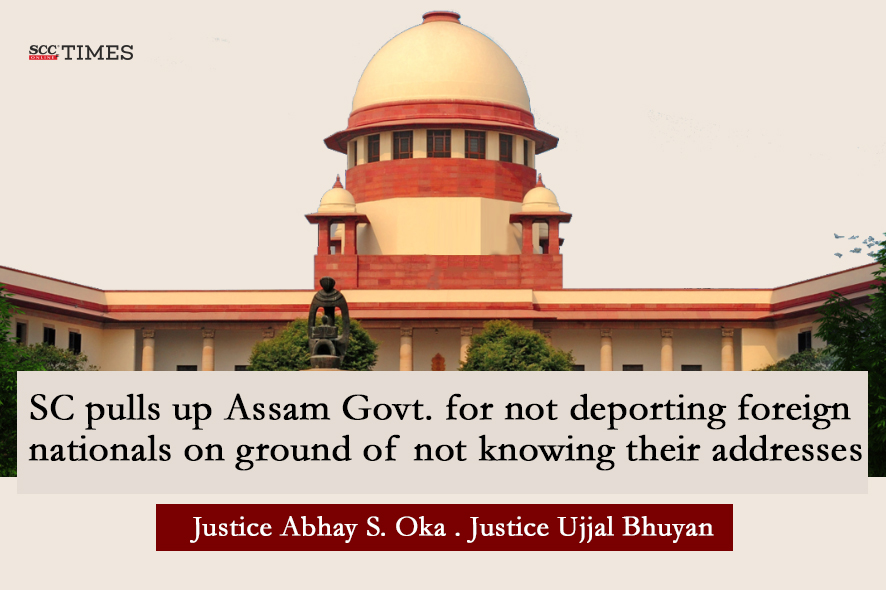 |
|
The Supreme Court of India recently issued a sharp reprimand to the Assam state government for its failure to deport individuals declared as foreign nationals. The court's criticism stems from the government's assertion that deportation efforts were hampered by a lack of knowledge regarding the detainees' addresses in their respective home countries. This justification, deemed insufficient by the justices, prompted the court to direct the immediate commencement of deportation procedures for all those officially classified as foreigners. The case, Rajubala Das v. Union of India, highlights a long-standing issue concerning the treatment and eventual repatriation of individuals held in Assam's detention centers.
The court's decision follows a series of directives issued earlier. On December 9th, 2024, the court ordered the Assam government to submit a detailed affidavit containing the names of all detainees, justifications for their detention, and a comprehensive outline of the steps taken to facilitate their deportation. This initial order aimed to bring transparency to the process and ensure accountability. However, the subsequent affidavit submitted by the state government on January 22nd, 2025, proved inadequate in the court's eyes. The affidavit failed to provide satisfactory explanations for the detention of 270 foreign nationals and lacked details about the planned deportation procedures. This deficiency prompted the court's strong rebuke, characterizing the state's response as a 'gross violation' of its previous order. The court noted with particular concern that some detainees had been held for over a decade, underscoring the urgency of the situation.
The prolonged detention of these individuals raises significant human rights concerns. The lack of concrete action by the Assam government, coupled with the inadequate information provided to the court, suggests a systemic failure in addressing the plight of those declared as foreign nationals. The court's firm stance underscores the importance of upholding due process and ensuring that individuals are not subjected to indefinite detention without proper justification or pathways for repatriation. The case serves as a crucial reminder of the need for transparent and efficient mechanisms for dealing with individuals deemed to be foreign nationals, balancing national security concerns with fundamental human rights protections. The implications of this ruling extend beyond the immediate case, potentially influencing future legal challenges related to immigration and detention policies within India. The court's order sends a clear message to state governments: accountability is paramount, and the prolonged detention of individuals without a clear plan for repatriation is unacceptable.
The legal arguments presented during the case highlight the complexities surrounding the deportation process. The petitioner, represented by senior advocates Colin Gonsalves and Kamran Khwaja, emphasized the violation of fundamental rights of the detained individuals due to prolonged and unjustified confinement. The Assam government, represented by a substantial legal team including Additional Solicitor General K M Nataraj and senior advocates, defended its actions, highlighting the bureaucratic challenges involved in identifying and deporting individuals without confirmed addresses in their home countries. The case underscores the need for improved coordination between the state government, central government agencies, and potentially international organizations to facilitate the identification and repatriation of foreign nationals, adhering to both domestic and international legal standards. The absence of such coordination is likely a significant factor contributing to the delays and failures highlighted by the Supreme Court.
The long-term consequences of this ruling remain to be seen. The Assam government now faces the significant challenge of implementing the Supreme Court’s order efficiently and effectively. This will require a substantial commitment of resources and a well-defined strategy for identifying, verifying the identities of, and facilitating the deportation of the individuals currently held in detention centers. The court's decision serves as a crucial impetus for reform and may necessitate policy changes at both the state and national levels to streamline the process of dealing with foreign nationals and prevent similar situations in the future. Monitoring the government's actions following this ruling will be crucial in assessing whether genuine progress is made in addressing the systemic issues that have led to this situation.
Source: SC pulls up Assam Govt. for not deporting foreign nationals on ground of not knowing their addresses
